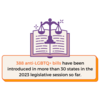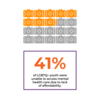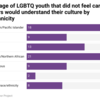Last year, state lawmakers introduced over 170 bills attacking transgender rights, marking a record number of anti-trans laws. That abominable record was sadly eclipsed just two months into 2023 as a barrage of bills sweep through the country, restricting access to sports, schooling, public performance, healthcare and more for transgender people. According to data from the American Civil Liberties Union’s tracker of attacks on LGBTQ+ rights, the current legislative session has seen 388 anti-trans bills introduced in more than 30 states. As more and more bills get written into law and expression of transgender identity continues to be criminalized, the stakes for trans students are higher than ever before.
I reached out to Dr. Kerith Conron, research director at the Williams Institute at UCLA School of Law, to unpack the impact of these grotesque policy developments on queer students and vent about the ongoing regression of our community’s fight for visibility, equality, and access. She connected me to Elana Redfield, federal policy director at the institute, and Dr. Genny Beemyn, the director of the UMass Amherst Stonewall Center and the coordinator of Campus Pride's Trans Policy Clearinghouse. These experts helped me wrap my head around the gravity of the challenges facing LGBTQ+ communities—especially trans people—and provided recommendations on how higher education can create a more accessible and safe learning environment for gender diverse students.
It goes without saying: these new laws attack the health, safety, and well being of trans people and demonize gender diverse communities across the country. Last week's Conservative Political Action Conference laid bare the hatred at the core of recent legislation. Michael Knowles, right-wing political commentator associated with the Daily Wire, didn't mince words. "For the good of society...transgenderism must be eradicated from public life entirely.”

Transphobic rhetoric and laws have proven deadly. Last year another horrific record was broken for the number of hate crimes against transgender people, especially Black trans women who face a disproportionate amount of violence. Redfield specifically highlighted the need to recognize intersectionality when discussing such bills, noting that when people are marginalized across several identities like race, disability, or economic status, policies must holistically address societal challenges.
These developments increasingly jeopardize transgender youth and students with gender diverse identities who are pursuing postsecondary education, as more students are reconsidering their college plans in the wake of dehumanizing laws.
“Some trans students are selecting to attend college and places with better laws and that is amazing for the people who can do that, and I wish that people could attend whatever institution they wish—particularly public institutions in their home states that are more affordable,” said Dr. Conron, noting that community college students and other college aspirants from low-income backgrounds don’t always have the resources to transfer or attend an out-of-state institution.
Some trans students are selecting to attend college and places with better laws and that is amazing for the people who can do that, and I wish that people could attend whatever institution they wish—particularly public institutions in their home states that are more affordable.

Dr. Kerith Conron
Research Director at the Williams Institute

We all strongly agreed that safety is a student basic needs issue that only exacerbates other basic needs, as these bans curtail students’ access to safe housing, healthcare, sports, and more. In Florida, state lawmakers are considering a new bill that would give governing boards of colleges and universities the authority to restrict majors and minors about gender identity and critical race theory, and bar the usage of funding to support programming related to such topics. Among the thirteen anti-trans laws introduced just last week, a new Missouri tax bill seeks to punish institutions providing gender-affirming healthcare. These bills further jeopardize the safety of transgender and other LGBTQ+ students during a time when 33% of those enrolled in four-year institutions report being bullied or assaulted, according to data collected by the Williams Institute.
Anti-Trans Bills and Basic Needs Insecurity: Analyzing the Scale of the Problem
Anti-trans legislation can affect trans students' access to housing and other basic needs in several ways. For example, some bills prevent trans people from using restrooms and locker rooms that align with their gender identity. This can lead to situations where trans students are forced to use facilities that don't align with their gender identity, which can be uncomfortable, unsafe, and stigmatizing.
Other bills restrict access to gender-affirming healthcare, including hormone therapy and gender confirmation surgeries, which can be essential for the well-being of trans students. In addition, some bills allow discrimination on the basis of gender identity in areas of employment and housing, which can make it harder for trans students to find and maintain safe and stable living arrangements.
Redfield emphasized that even though most bills restricting gender-affirming care are targeting minors, they still have the ability to impact college students. She shared that a new bill introduced in Oklahoma seeks to ban health care providers from administering or recommending gender-affirming medical care including surgeries, puberty blockers and hormones for patients younger than 26 years old, punishable by an unclassified felony conviction. Healthcare providers in Oklahoma could also potentially get their medical license revoked for “unprofessional conduct.”
“Young people trying to access this care are grappling with legislative attacks and also the misinformation that gender affirming care is experimental, or that people are going to change their minds, and they're not going to follow through with it,” Redfield said. “That's a huge stressor, especially given how critical of an intervention it is for people to have gender affirming care.”
Though at least 400 colleges currently list gender-inclusive restrooms on their website, bathroom bills such as Arkansas SB270 and Idaho S1016 are increasingly threatening access to public spaces for gender diverse students. Dr. Beemyn shared that Campus Pride continuously updates its directory of LGBTQ-friendly colleges across the country and tracks gender-inclusive policies at institutions to help students choose a safe college environment.
Young people trying to access this care are grappling with legislative attacks and also the misinformation that gender affirming care is experimental, or that people are going to change their minds, and they're not going to follow through with it.

Elana Redfield
Federal Policy Director at the Williams Institute

“There's not always recognition that anti-LGBTQ lawmaking is a form of violence. When LGBTQ+ students of color are navigating racist violence and anti-LGBTQ+ violence, that intersectional angle can also sometimes get missed,” Redfield said. Transgender and other LGBTQ+ students belonging to low income backgrounds and institutionally marginalized racial identities face additional barriers to healthcare access due to their intersectional identities she added.
Her point is backed by data. According to the Trevor Project, 41% of LGBTQ+ youth were unable to access mental healthcare due to lack of affordability. And, out of the respondents who indicated that they feared health care providers wouldn’t understand their culture, 18% were Asian American, 21% were Middle-Eastern, and 13% were Black, compared to only 2% of White respondents who experienced lack of cultural competence in health care providers.

What’s more, LGBTQ+ youth experience higher rates of depression and anxiety compared to their straight, cisgender counterparts. A recent survey by the Trevor Project revealed that 79% of young transgender men and 71% of young transgender women experienced symptoms of anxiety. This is due to a range of factors, including social stigma, discrimination, and rejection from family, friends, and society at large. LGBTQ+ youth may also face additional stressors related to their sexual and gender identities, such as coming out, navigating dating and relationships, and finding affirming healthcare.

How Colleges and Policymakers can Step Up to Support Transgender Students
According to Dr. Conron, most transgender students enter college with 18 or more years of lived experience of being misgendered, discriminated against, and treated poorly by healthcare providers. This causes anxiety and a lack of trust, which prevents them from accessing supports available on campus. A designated point person for LGBTQ+ students who is culturally competent and experienced can empower them to ask for help, and get connected to resources.
“Some of these policies take years to happen and a lot of times, the administration will try to wait students out—students will protest and the administration will agree to talk about it but then those leaders graduate before anything comes of it. It's really important that there be a staff person whose job specifically entails providing support and resources to trans students,” Dr. Beemyn said.
“This is a place where people need to take a stand, and even if it's going to potentially be problematic with state officials, institutions need to stand up if they value diversity,” Dr. Beemyn added, offering the example of Appalachian State University in North Carolina which found its housing policy to be at odds with the state’s restrictive guidelines. The university's administration must find ways to provide gender-inclusive housing while also complying with a state law that restricts housing based on assigned sex at birth. Redfield and Dr. Conron also stressed the importance of visibility, in which a signal of support by institutional administration can go a long way in making transgender students feel secure and cared for during this period of heightened hostility.
It's really important that there be a staff person whose job specifically entails providing support and resources to trans students.

Dr. Genny Beemyn
Director of the UMass Amherst Stonewall Center
Dr. Conron lamented the lack of messaging from college presidents and deans about the recent anti-trans policy developments, and their impact on the wellbeing and safety of trans students on campus. She pointed out that because universities already have mechanisms in place for student outreach in times of adversity (e.g. in the wake of natural disasters or all too frequent incidents of gun violence), they should make a larger effort to visibly express solidarity with LGBTQ+ students during this distressing time.
“One of the recommendations we've made across all our reports is to have advisory groups of students and faculty because people who are local are going to have some really good ideas and understand the local culture, community and opportunities,” Dr. Conron said. “I think that is an action step that all colleges, universities and community colleges can take.”
Dr. Conron and Redfield also touched on the importance of on-campus food pantries for LGBTQ+ students who can sometimes fear seeking resources from religiously affiliated banks. Redfield, who also served as the first Director of LGBTQI Affairs at New York City’s Department of Social Services, shared her experience of trying to connect LGBTQ+ communities with food resources by encouraging local food banks to self-identify as supportive of their identities. Many queer people may fear being turned away or treated badly at these sites, which are often religiously affiliated, because of their sexual orientation, gender identity or expression. In her experience, signage that prominently marks a space as LGBTQ+ affirming can go a long way in making students feel welcome and supported.
As legislative attacks on the safety, well being and gender expression of transgender people continue to be written into law, colleges must stand up to support gender diverse student populations.


